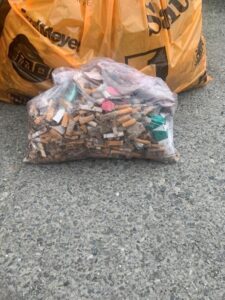July is Plastic Free Month. It’s a global movement to encourage people to be part of the solution to plastic pollution. You can check out your plastic usage by filling out this quiz. That quiz also allows the Plastic Free Foundation to track plastic usage trends. Want ideas on how to use less plastic? Check out Plastic Free July.
Source: National Geographic (Cigarette butts are toxic plastic pollution. Should they be banned? (nationalgeographic.com))
What Does Plastics Have to Do with Smokefree Housing?1,2,3,4,5
Plastic, Tobacco Products, and Litter
- Nearly all commercially made cigarettes contain filters. These filters contain the plastic known as cellulose acetate.
- Cigarettes are the most frequently littered item in the U.S., totaling at about 9.7 billion butts littered, or 19.6% of all littered items.
- Cigarettes weren’t categorized as plastic in the report being cited here. If they were, they make up 3.4x more litter than the leading plastic product.
- The plastic in cigarette filters can only degrade under severe biological conditions, like if they collected in sewage. Cigarette butts tossed in streets generally won’t degrade because the conditions are not severe enough.
- Electronic cigarettes contain plastic as well as other toxic chemicals for the environment. The most recent estimates state about 894,700 bits of e-cigarette waste.
- E-cigarettes cannot biodegrade, even under severe weather conditions.
- Cans for chewing tobacco and cigarette packs may be made from or contain some plastic. Tobacco-related products and packaging made up 391,995,200 bits of litter.
Costs of Tobacco Litter and Litter in General
- A study of the 30 largest US cities in the U.S. estimated that tobacco product cleanup ranged from $4 million (Portland/Las Vegas) to $80 million (NYC).
- Cigarettes butts was the second leading contributor to when people seeing someone litter, at about 56% of residents reporting that.
- People who smoke are more likely to litter if the environment contains litter.
- The presence of litter in a community decreases property values by 7%.
- If you own and want to sell, 60% of property appraisers would reduce the home value if its littered. Littered areas would influence people’s decision to buy a property.


Image: Some of the cigarette butts and e-cigarette waste picked up in Anchorage during Citywide Cleanup. We were only out for about an hour.
Resources to Learn More
- Talking trash: Behind the tobacco industry’s ‘green’ public relations (who.int): 1.5 hour long webinar from the World Health Organization. It officially starts at about 8 minutes.
- Tobacco and the environment (truthinitiative.org): The Truth Initiative dives deeper into tobacco’s impacts on the environment.
- Tobacco and the Environment – TobaccoTactics: article talk about the life cycle impacts of tobacco (from growing to using) and includes some information on tobacco industry marketing.
- Environmental Impacts of the Tobacco Lifecycle | CDC: environmental and health impacts of tobacco through the entire life cycle from.
What Can I Do to Prevent Tobacco Litter?
- Don’t start using any kind of tobacco.
- Quit if you do use a tobacco product. Don’t switch what you use.
- Consider pocket a pocket ashtray if you aren’t quit ready to quit. Especially if you’re in an area that doesn’t have a lot of public trash cans.
- The DEA accepts vaping devices during their Drug Take Back Day. You will have to remove the batteries from them as they aren’t accepted.
- Participate in events like Citywide Cleanup, Adopt-a-Road, or Adopt-a-Trail.
- Adopt a policy that prohibits smoking at your property. Call the American Lung Association at 907-931-5470 or email SmokefreeHousingAK@Lung.Org if you want assistance.
References
- Tobacco and the environment (truthinitiative.org)
- Litter-Study-Summary-Report-May-2021_final_05172021.pdf (kab.org)
- Tobacco and the environment (truthinitiative.org)
- Cigarette Butts and Other Tobacco Product Waste Costs Taxpayers Millions of Dollars – Thirdhand Smoke Resource Center
- KBB-Littering-Facts.pdf (barrowga.org)



